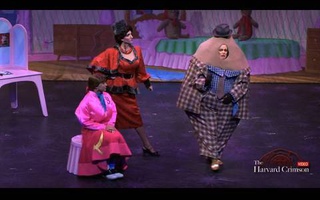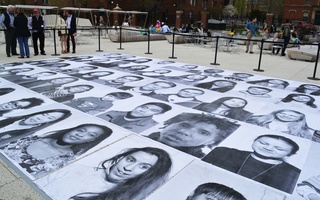As a freshman, Christine K.L. Bendorf ’10 aspired to become an economist. But after taking the first semester of Social Analysis 10: “Principles of Economics,” she realized she did not enjoy the field. Acknowledging “the error of her ways,” she dropped the course.
Her freshman adviser urged her to take classes that she would enjoy for their own sake, explaining that her concentration would fall into place from there.
After dabbling in music, literature, and theater classes that spring, Bendorf decided to design a special concentration in Dramatic Literature and Practice. It consists of both English department classes in dramatic literature and Dramatic Arts courses in acting.
After graduation, Bendorf—who has performed in several student theater productions at Harvard, including “Into the Woods” this spring—plans to move to New York City to try to become a professional actress. She describes the prospect as “a little bit scary” but says she would not have felt as prepared if she had gone to a conservatory.
Bendorf is not alone. A number of students involved in theater adapt Harvard’s resources to their ideas. While Harvard does not have a Dramatic Arts concentration, students say that theater’s unstructured presence in undergraduate life has been an advantage, since it allows students to craft their own artistic experiences.
DIVERSE EXPERIENCES
Since there is not one set path for students involved in theater at Harvard, they pursue their interests on the stage, in the classroom, or both.
The students range from Charles T. James ’09-’10, who is working toward a secondary field in Dramatic Arts, to Michael A. Yashinsky ’11, who has been heavily involved in directing and acting in student productions but has never taken a Dramatic Arts class.
James—a Government concentrator who is involved in On Harvard Time and LevSPN, Leverett’s online intramural sports channel—took his first Dramatic Arts class the summer before sophomore year. He calls it “the most addictive class” he has ever taken.
He says that he has not been very involved in theater productions at Harvard because of the necessary time commitment. Instead, he has focused on classes in Government and the Dramatic Arts.
James says that he aspires to go into broadcasting, advertising, or political consulting. He explains that no matter which path he chooses, drama has taught him invaluable skills in self-expression and body language.
At the opposite end of the spectrum, Yashinksy has accumulated a long roster of theater experience during his time at Harvard. He has never taken a Dramatic Arts class, saying he uses his classes for inspiration.
For example, Societies of the World 32: “The Political Development of Western Europe,” which he took last fall, led him to set Puccini’s Tosca in western Italy. He directed Tosca for the Lowell House Opera in the spring.
“We’re all concentrating in something different, and I think maybe that makes us more interesting as performers and directors and being able to bring different aspects of the world into the theater,” says Yashinsky, a History and Literature concentrator.
Yashinsky, who has interned at a Vienna opera house and the Detroit Opera House, says he would like to go into theater after college.
Read more in News
Police Stop Robber Red-Handed on TRecommended Articles
-
 A Call to Arts
A Call to Arts -
Arts Year In ReviewCrimson Arts takes stock of 2013.
-
 Trumpets Herald New Office of the Arts Ceramics Studio in Allston
Trumpets Herald New Office of the Arts Ceramics Studio in Allston -
Margaret Atwood Awarded 2014 Harvard Arts MedalAcclaimed author Margaret E. Atwood was honored with the 2014 Harvard Arts Medal in a ceremony Thursday to mark the beginning of the 22nd Annual Arts First Festival.
-
 Arts First Draws Half of Harvard Undergrads
Arts First Draws Half of Harvard Undergrads -
 New Concentration Was Years in the Making
New Concentration Was Years in the Making













